Members of organised labour are currently picketing offices of the Nigerian Electricity Regulatory Commission (NERC) nationwide.
The Nigeria Labour Congress (NLC), Trade Union Congress (TUC), and other affiliate groups, are protesting the increase in electricity tariff for customers under the Band A category.
On April 3, NERC approved an increase in electricity tariff for customers in the classification — from N66 to N225 per kwh.
Organised labour is calling for a reversal of the increase and a return to the negotiating table.
On Monday, the unionists arrived at the NERC office located at Novel House in Ikeja, Lagos, around 9:40am.
Addressing workers at the complex, Funmi Sessi, NLC Lagos chairperson, asked them to vacate their offices.
Sessi said the unions do not understand the regulatory functions of NERC amid the epileptic power supply in the country.
In Abuja, the unions besieged the NERC office located in the Central Business District.
Labour has also shut NERC offices in Jos, Akwa Ibom, Benin, Kaduna and in other capital cities across the country.
LAGOS
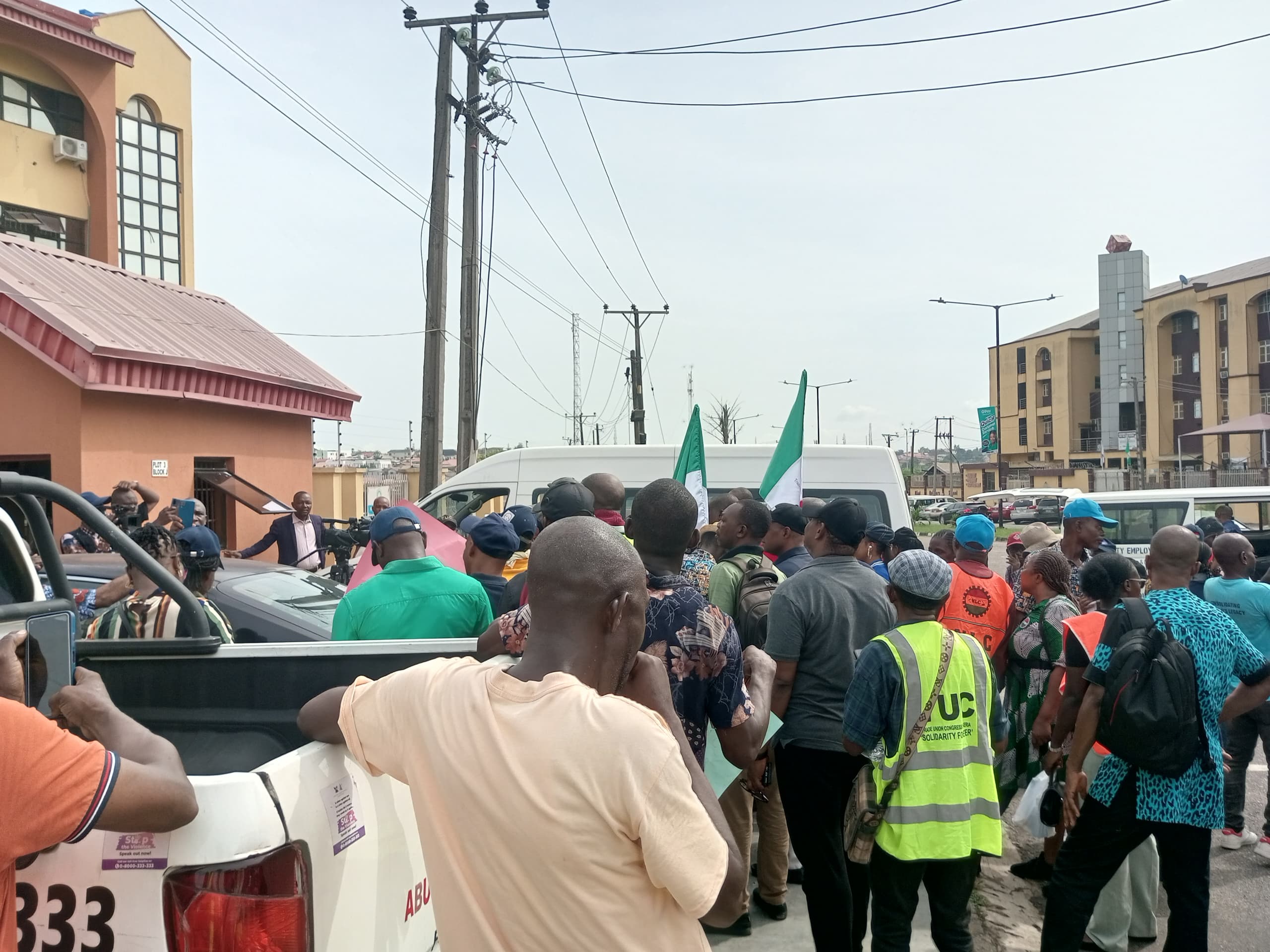
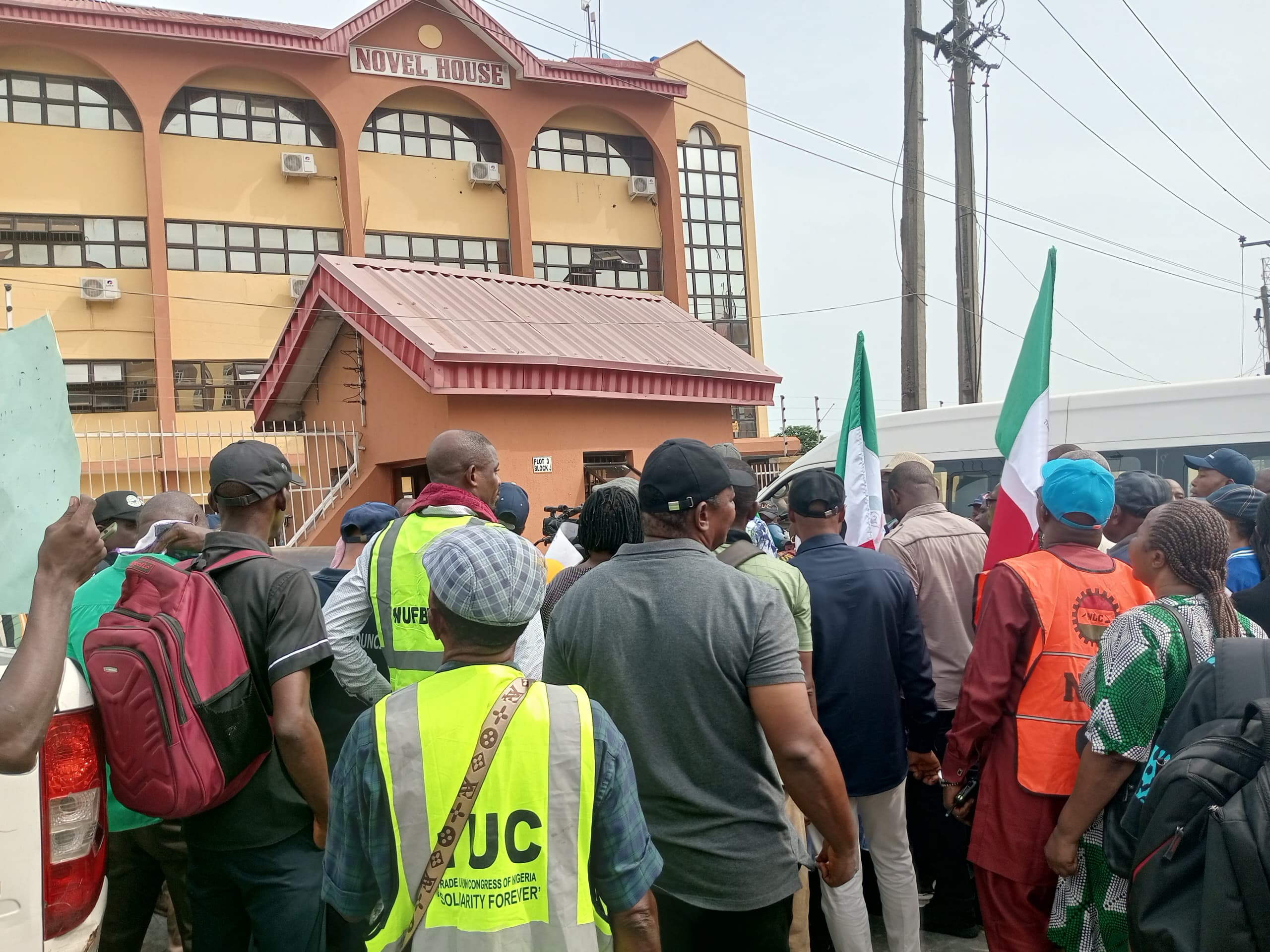
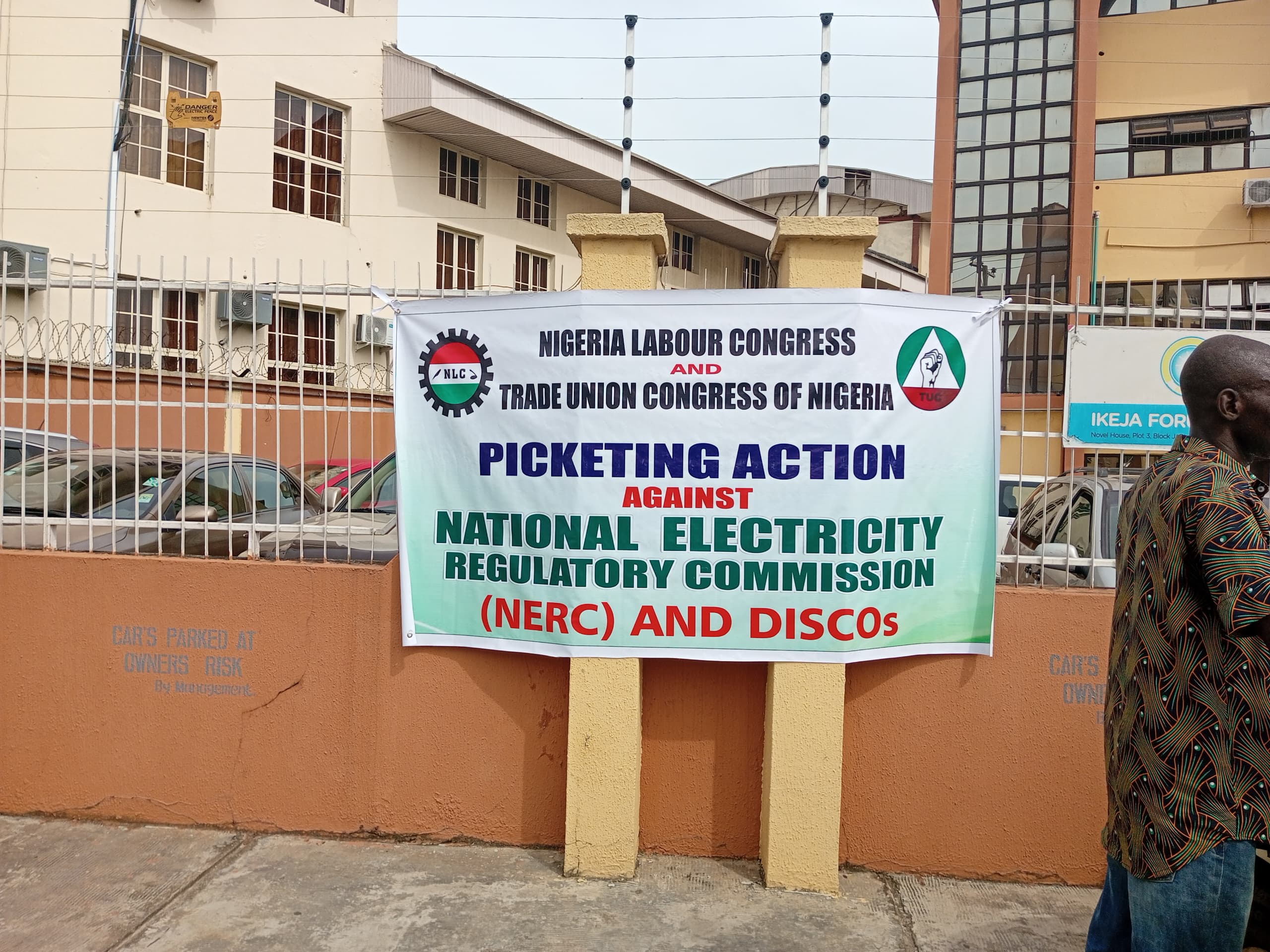
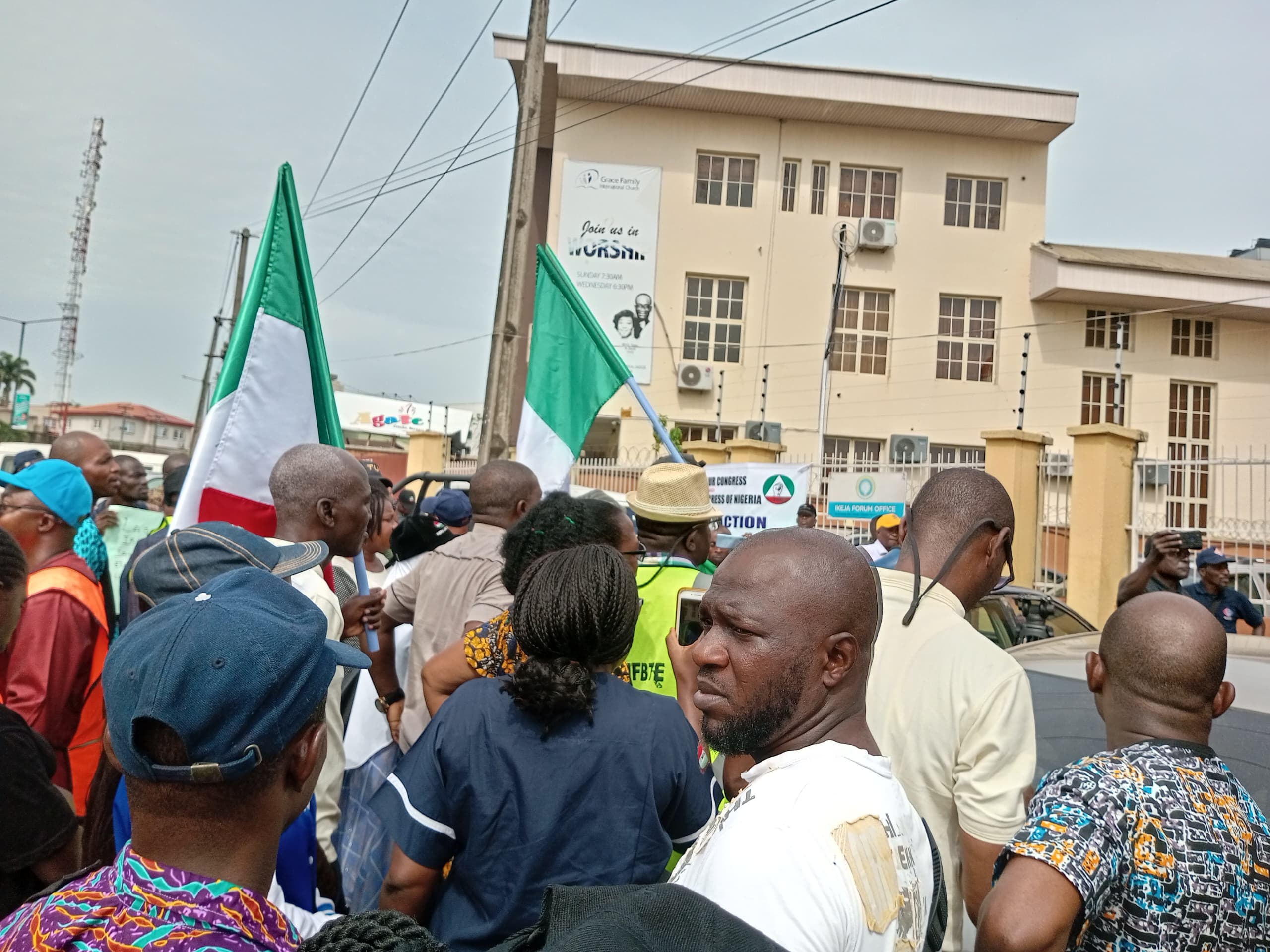
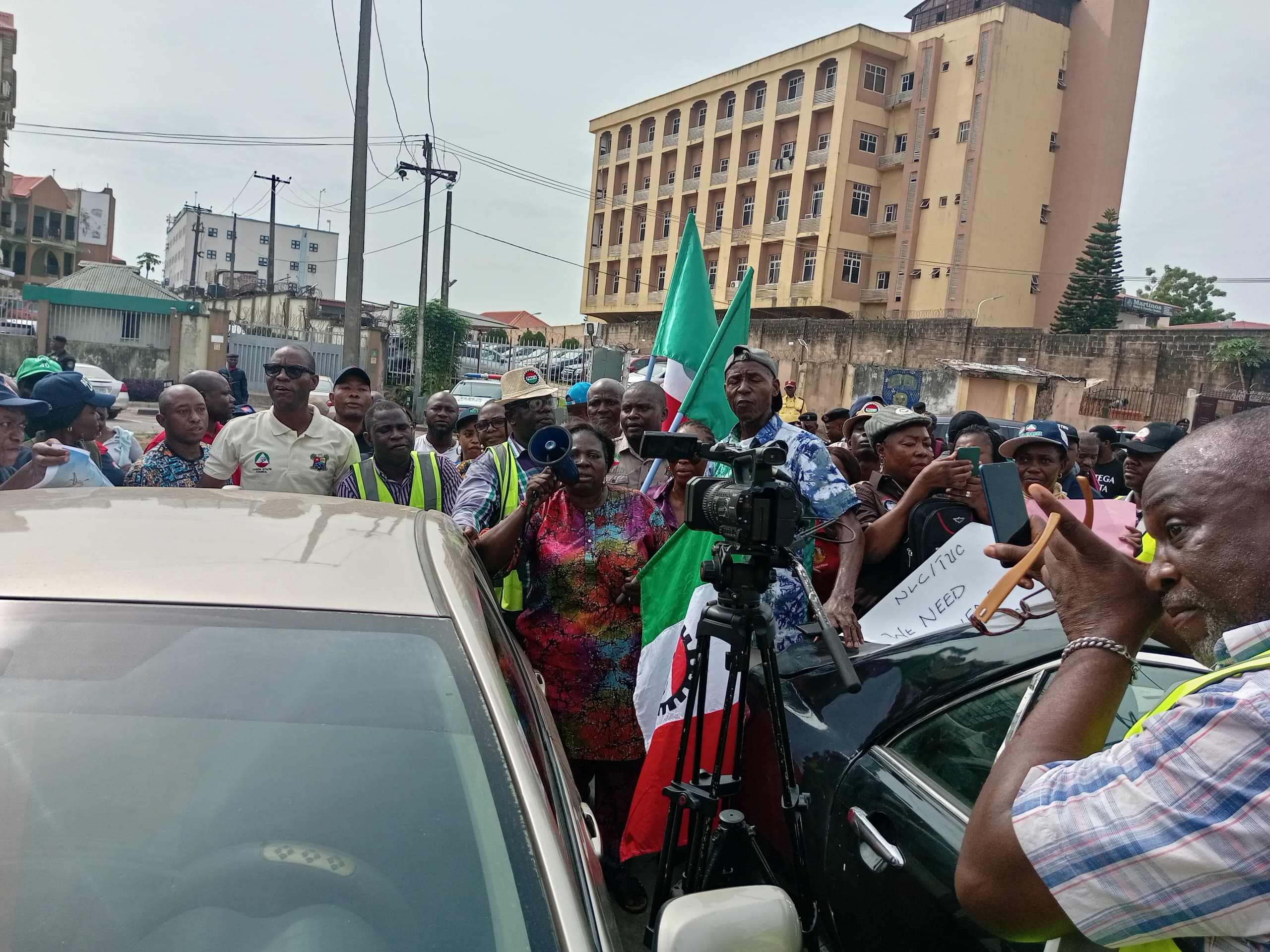
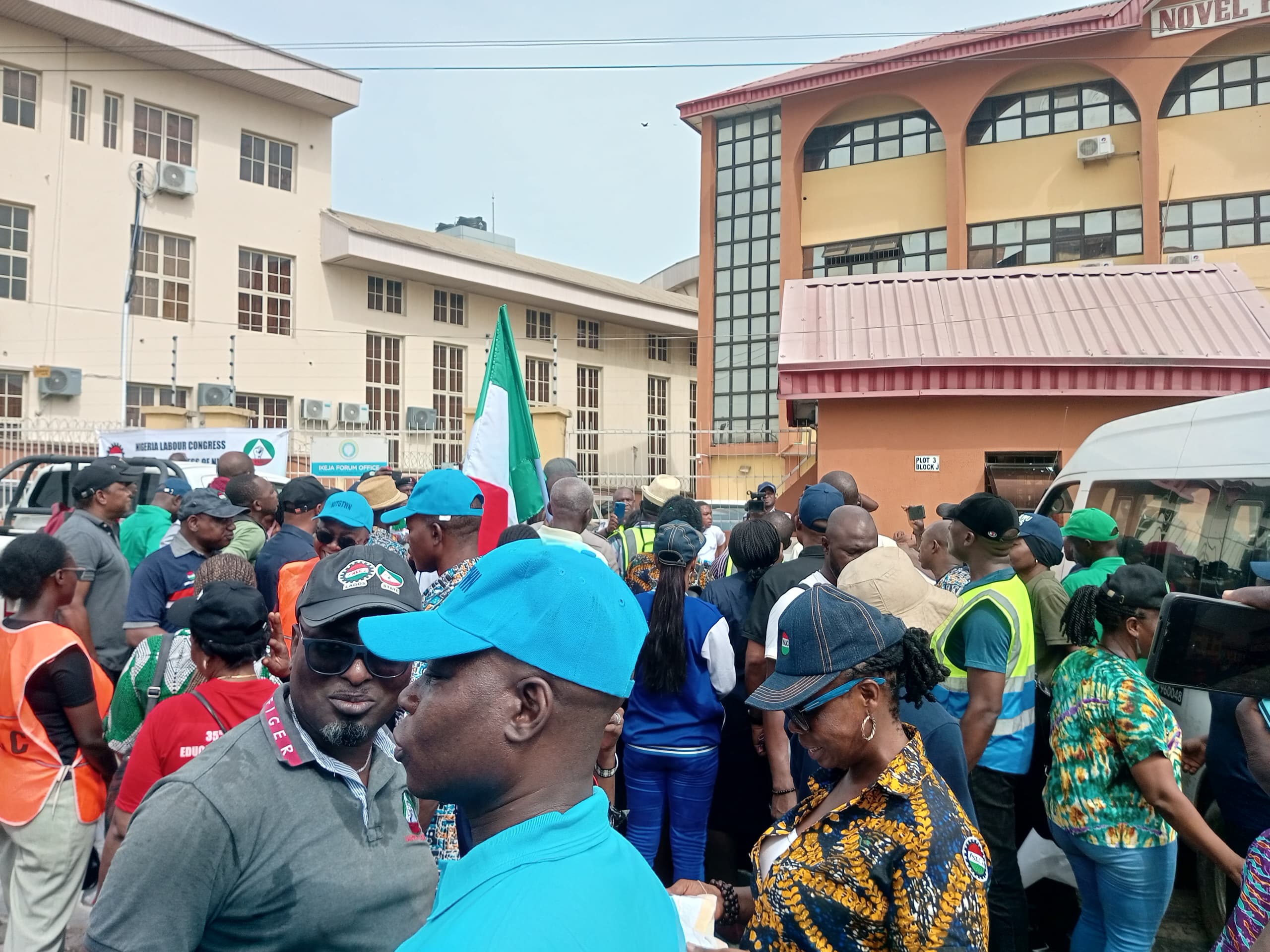
ABUJA
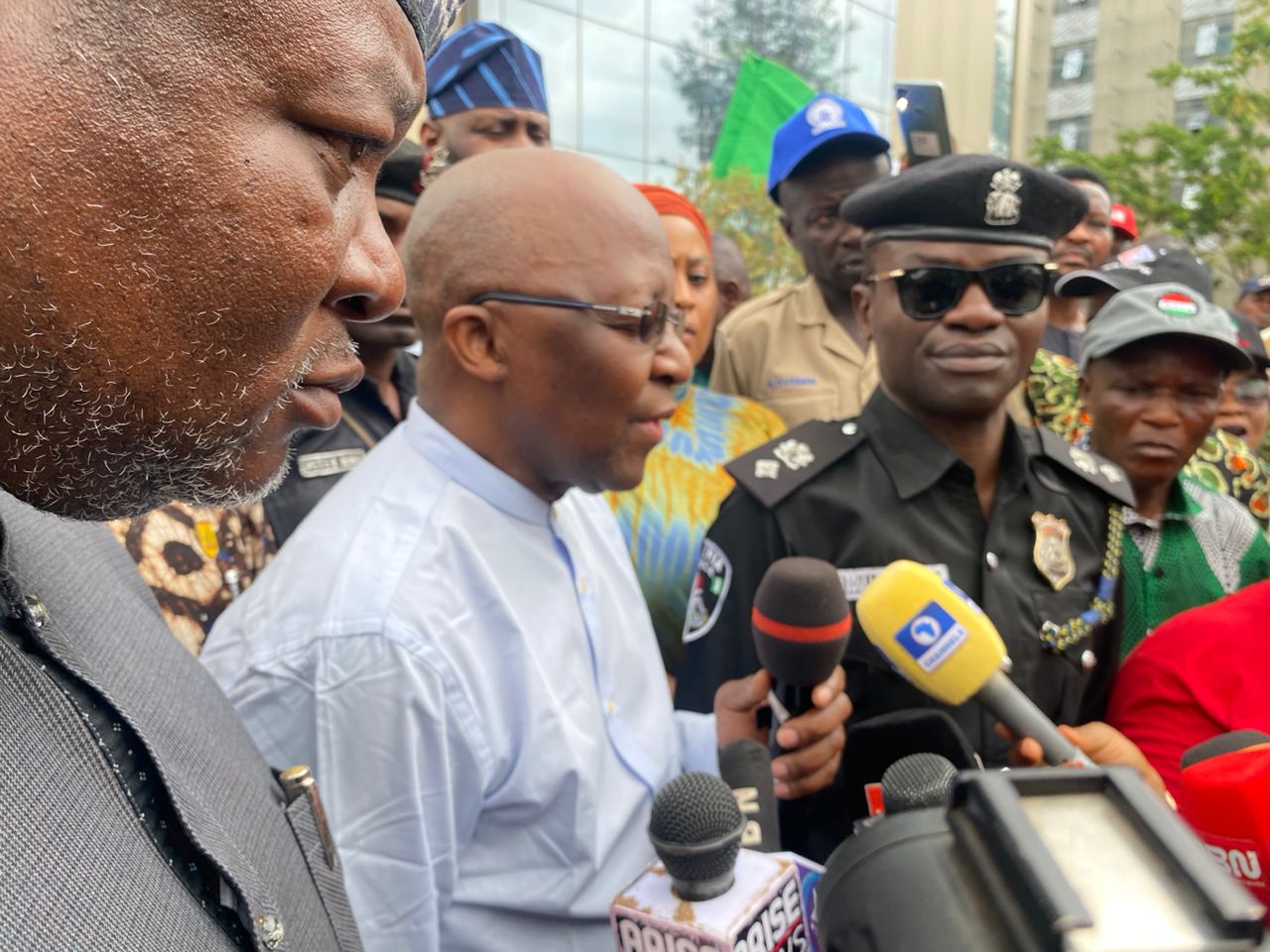
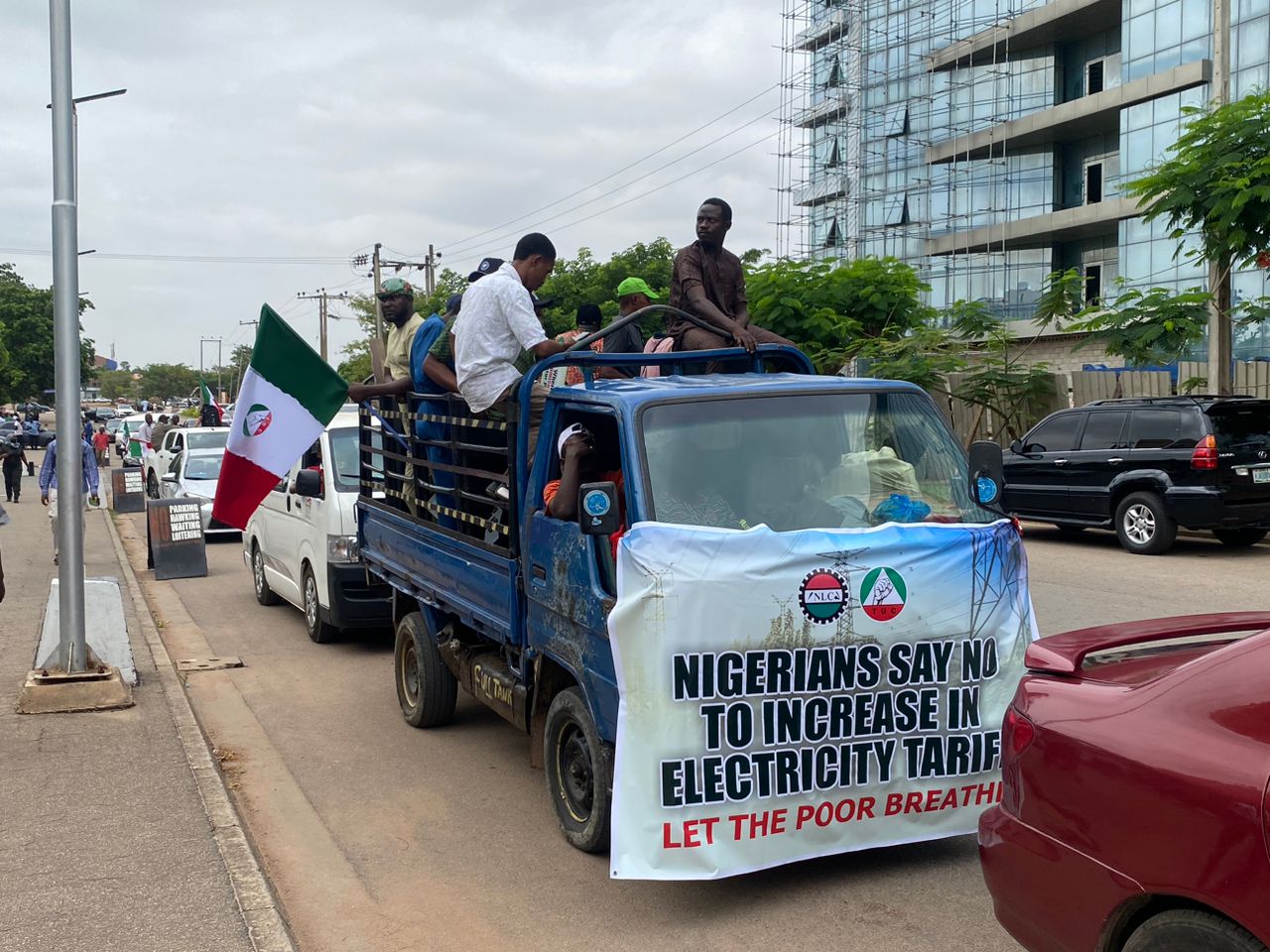
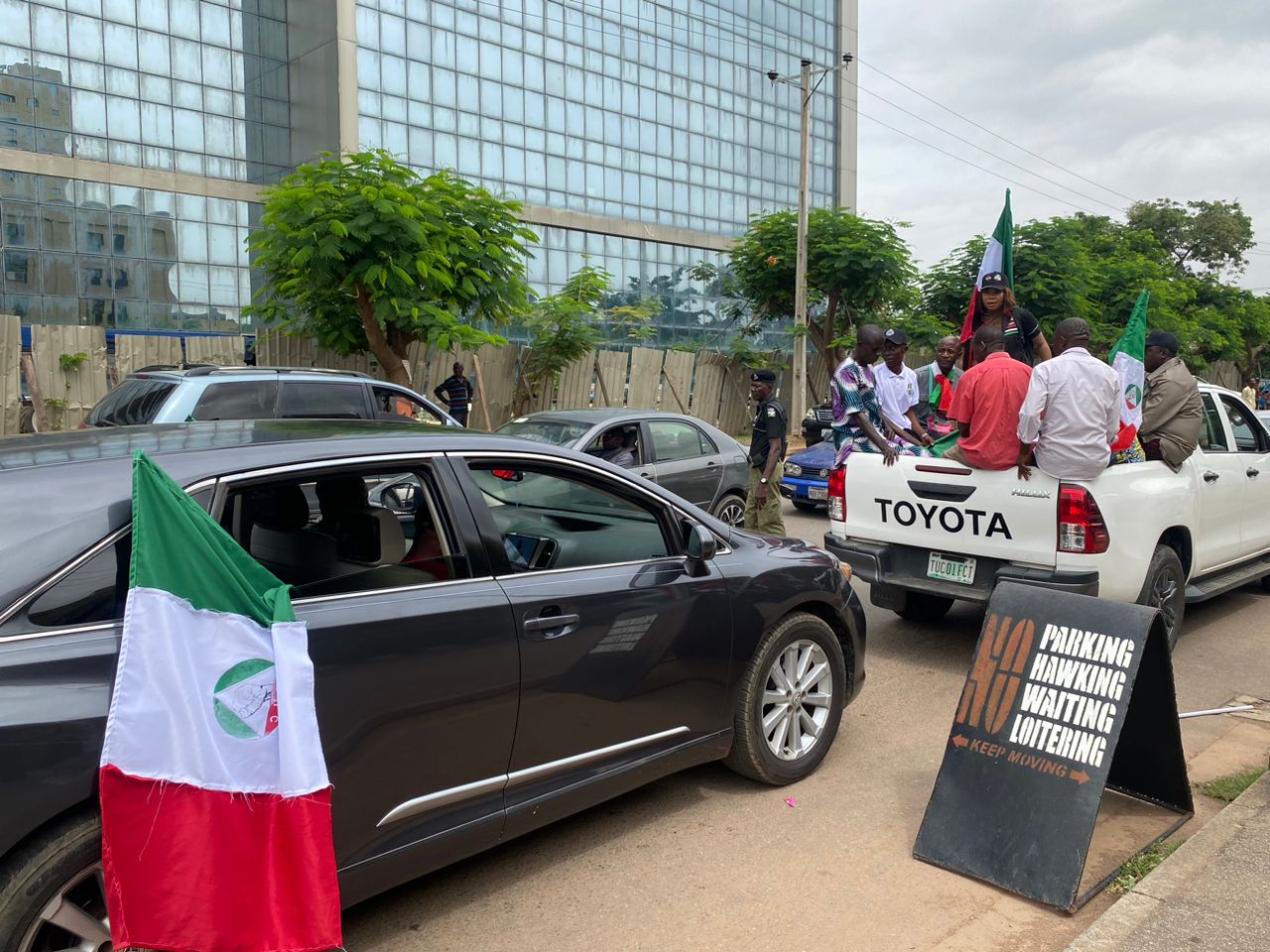
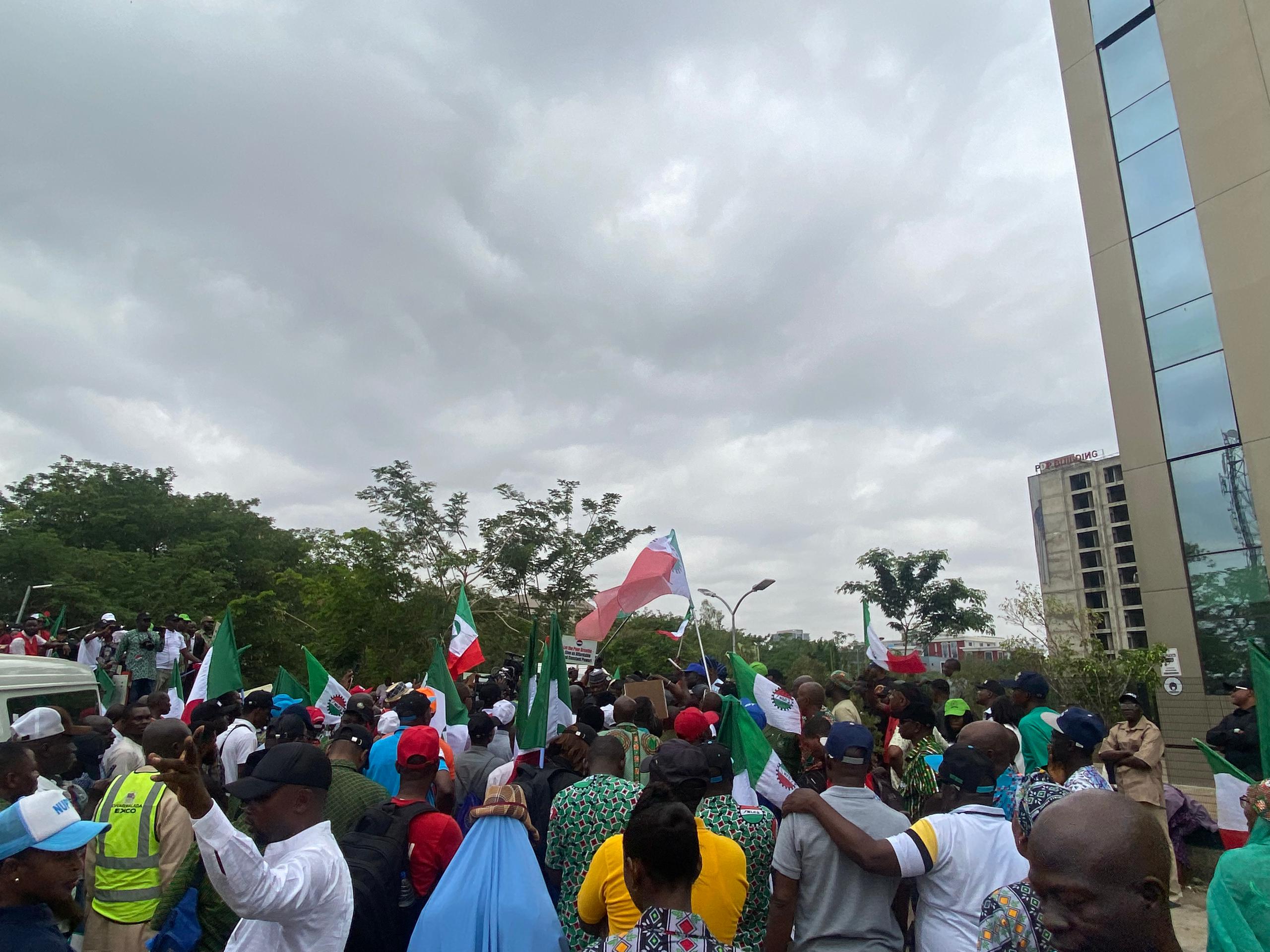
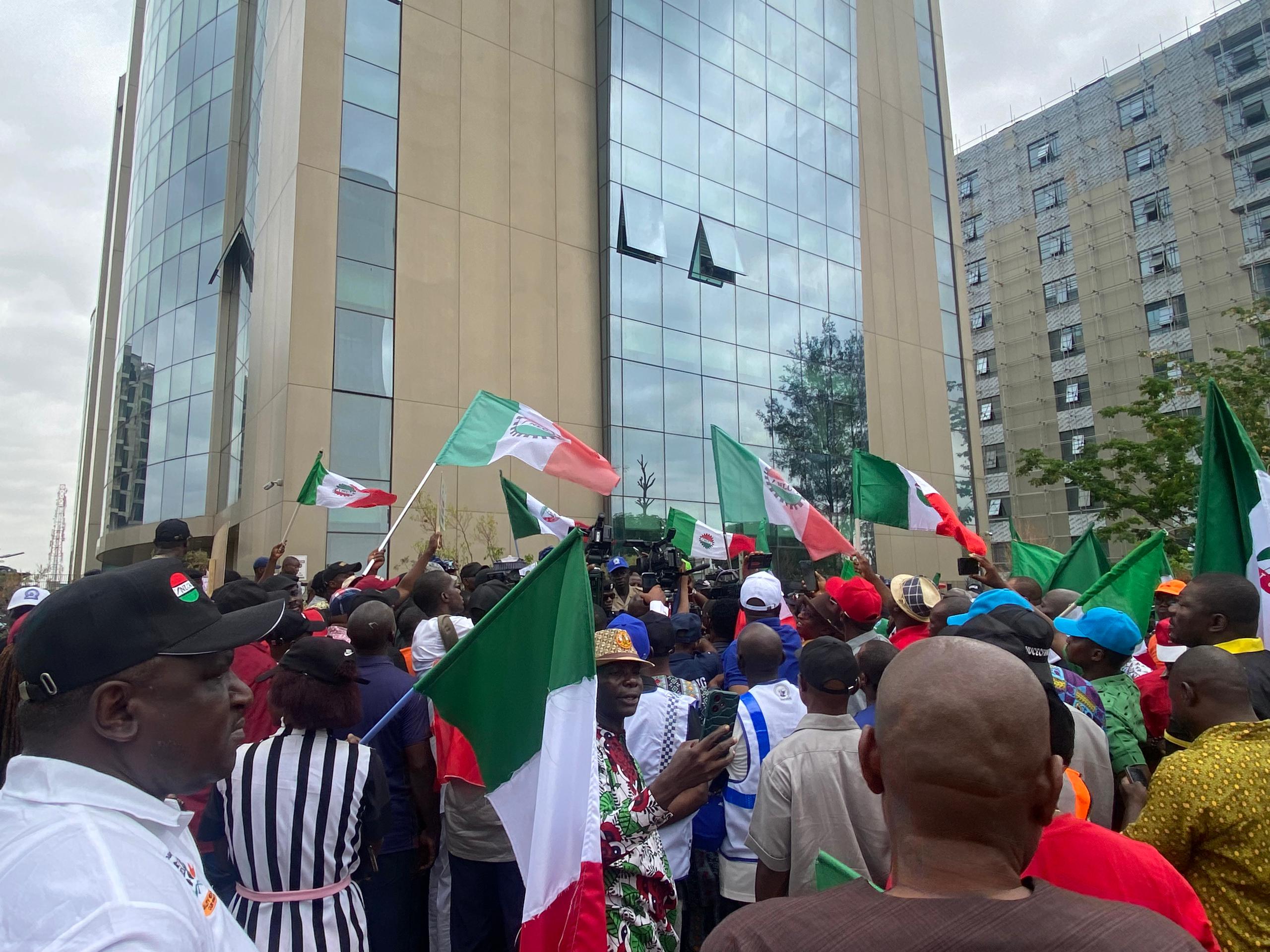
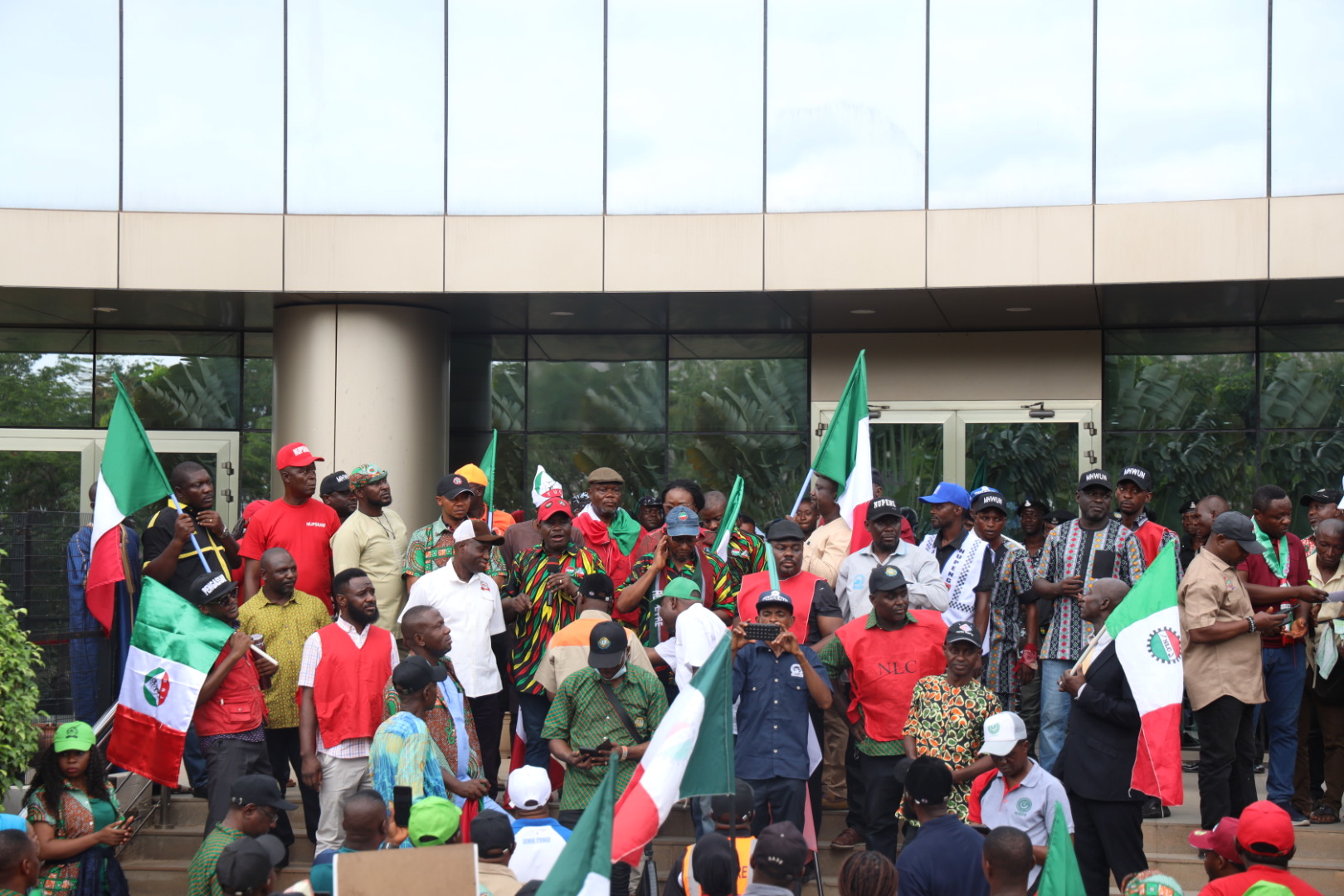
The former member of the Board of the Trustees, BoT, of the Peoples Democratic Party, PDP, and a former ally of Governor Godwin Obaseki, Charles Idahosa has rejoined the All Progressives Congress, APC.
Idahosa said he was rejoining the party he left with Obaseki about four years ago to ensure victory for the APC in the September 21 governorship election.
He made this statement at his residence where he was received by leaders of the party, led by the Secretary of the APC in Edo State, Lawrence Okah.
Idahosa revealed that his greatest regret while in PDP, was not allowing Obaseki to resign as Edo Governor when he opened up to him (Idahosa) in his Benin residence that he was tired of the troubles he was getting from the leadership of the party led by Comrade Adams Oshiomhole.
Olayemi Cardoso, governor of the Central Bank of Nigeria (CBN), has hinted interest rates would remain high until inflation rate subsides.
In a Financial Times report on Monday, Cardoso also said orthodox policies would be implemented to tame inflation.
In March, Nigeria’s inflation rate rose to 33.20 percent — from 31.70 percent in February.
Consequently, CBN’s monetary policy committee (MPC) raised the interest rate by 200 basis points in March to 24.75 percent.
Cardoso said there is “every indication” that MPC would “do whatever is necessary” to rein inflation.
“They will continue to do what has to be done to ensure that inflation comes down,” Cardoso said.
“Let’s face it: for a long period of time, the CBN did not embrace orthodox monetary policies.
“We want to go back to using an orthodox method, and it will take us to where we want to go.”
Cardoso said the apex bank had been “reoriented” to focus on “price and monetary stability”.
He said the official window of the foreign exchange (FX) market has been stabilised.
According to the governor, investors previously had a “tendency to head for the window” in response to currency fluctuations, however, there has been a “fundamental shift”.
“They’re getting more comfortable with the market,” Cardoso said.
The naira fell to its lowest level of N1,627.40/$ in the official FX window on March 8 but rallied to N1,154.08/$ on April 18 — after which the local currency began to lose its gains.
As of May 10, the official FX rate stood at N1,466.31/$.
Also, Cardoso maintained that raising interest rates has been crucial.
He hoped that high interest rates would not linger for too long and act as a disincentive to investment and production.
“Hiking interest rates obviously has had a dampening effect on the foreign exchange market, so that has begun to moderate. It’s not a zero-sum game. You lose on one side, you get on the other,” he said.
He said inflation was higher than he had hoped, blaming “distortions” mainly due to high food prices.
Cardoso said it is not directly within CBN’s control.
Food inflation rose to 40.01 percent in March, compared to the 24.45 percent rate recorded in the same month last year.
KPMG Nigeria says the implementation of the cybersecurity levy should be reconsidered due to the current economic climate.
On May 6, the Central Bank of Nigeria (CBN) directed deposit money banks (DMBs) to start charging a 0.5 percent cybersecurity levy on electronic transactions, in line with the Cybercrime Act 2024 as amended.
Speaking on the directive in its latest tax alert issue, KPMG said this is certainly “not the right time to implement this levy”.
The firm added that although the idea was not new, it was unjustified under the prevailing economic condition.
KPMG said the key objective of the cybercrime levy is to ensure that there is dedicated and adequate funding available to address the growing threats of cyber-attacks.
However, KPMG said higher taxes do not lead to sustainable growth, adding that no country can tax itself to prosperity.
According to the firm, unintended consequences of any measure must be thoroughly evaluated before implementation.
“Undoubtedly, Nigeria faces a significant revenue challenge. This has, therefore, constrained, and continues to constrain, the country’s capacity for achieving sustainable growth,” KMPG said.
“Given this context, the government may go to any length to mobilise the required revenue.
“Perhaps, it is in recognition of this that the current administration and the Presidential Committee on Fiscal Reforms have often emphasized that the government will not introduce new taxes. Though the cybercrime levy is not new as it has been in existence since 2015, the question is why implement it now given the prevailing economic challenges?
“The timing of any reforms is essential to the success of such reforms. This underscores the current public resistance to the implementation of the levy.
“Hopefully, the National Insurance Commission (NAICOM) and the Nigerian Communications Commission (NCC) will consider this before introducing their guidelines with respect to those businesses under their purview.
“However, consideration must be given to the country’s prevailing economic conditions. The current economic climate does not justify its implementation now.”
FG SHOULD FOCUS ON TAX REFORMS THAT ADDRESS REVENUE LEAKAGES
KPMG said the federal government should focus on reforms that address revenue leakages and be financially prudent in the utilisation of public funds.
“Various reports have indicated that the government will raise about N3 trillion annually from the levy,” the firm said.
“However, there has been no formal presentation to the public of the cost and benefit analysis. It is always critical that the enactment of any tax or levy be accompanied by the tax expenditure statement to provide information as to whether the benefits of such tax or levy outweigh its cost.
“It is not sufficient to provide only the revenue projection, which is not certain as no details have been provided with respect to this; albeit there have been reports on how the money would be spent.
“There are many government agencies that have not been audited for years and nothing has happened! It is, therefore, critical that practical measures be put in place to ensure transparency and accountability.
“Hopefully, the government will reconsider delaying the implementation of the levy, which has been in the books since 2015.
“Government should focus on tax reforms that address revenue leakages and be financially prudent in the utilisation of public funds.
“Combining revenue-raising initiatives with responsible spending practices is essential for fiscal sustainability.”
The firm also raised concerns that businesses may resort to any measures to avoid the payment of the levy.
KPMG also said it is important that the government consider phasing in tax reforms on a gradual basis to minimise potential shocks to the economy.
The federal government said that the days of being above the law in paying taxes are over.
The Chairman of the Presidential Fiscal Policy and Tax Reforms Committee, Taiwo Oyedele, said this at the committee’s closing session on Sunday in Abuja.
Oyedele said the proposed new reforms would focus on the top 5 per cent of that sector, the middle class, and the elite for taxes.
He stated that the committee is drafting legislation to bring about necessary changes to the country’s fiscal policy and tax reform ecosystem.
The chairman stated that the new laws will ensure that reviews are continued by all governments, adding that they don’t want the entire effort to go to waste after a year or two.
He urged all stakeholders to fully cooperate with the government in implementing a new fiscal and tax policy for the general good of the citizens by ensuring compliance.
“We think that the days of being above the law in paying taxes are over. The same thing we’re saying to our leaders, whether they are elected or appointed.
“We think they have to lead by example by showing that they have paid the taxes, not only on time but correctly, to the lawful authorities as contained in the various laws,” he said.
He stated that the Federal Government is developing a system that will give tax relief to 95% of the informal sector in the country.
He said this would be achieved by exempting businesses earning N25 million a year or less from the various taxes hindering their progress over time.
“So, we think that 95 per cent of the informal sector should be legally exempted from all taxes; withholding tax, company income tax, and even payees on their staff.
“We’re using data to inform our decisions. Currently, if you earn N25 million a year or less, you don’t have to pay company income tax, and you don’t have to worry about VAT.
‘’We think that the informal sector are people who are trying to earn legitimate living; we should allow them to be and support them to grow to a point where they can then have the ability to pay taxes,” he said.
He explained that some of the taxes Nigerians complained about were already in the constitution, which the committee had examined and called for review.
Oyedele said that the committee report will go through the standard legislative process to obtain full legal backing.
Several key political figures in the Andoni local government Area of Rivers State have expressed their admiration for the dedication shown by the Minister of the Federal Capital Territory (FCT), Nyesom Wike, towards advancing the goals of President Bola Tinubu-led administration, Naija News reports.
The group includes former and current political leaders from the Peoples Democratic Party (PDP), All Progressives Congress (APC), and Labour Party (LP), as well as respected Elder Statesmen, Community Leaders, Youth, and Women Leaders from the region.
They emphasized their unwavering support for Wike as a token of gratitude for his backing of Erastus Awortu during the 2021 Local Government Chairmanship election.
The political bigwigs also commended Awortu’s administration for proffering solutions to insecurity and decayed infrastructure in the area.
During a recent visit to the council’s chairman at Ngo, the group expressed their admiration for his accomplishments as his tenure nears its conclusion. Additionally, they assured him of their unwavering support for his re-election campaign.
The National Women Leader of the GrassRoots Development Initiative (GDI), Mabel Ogolo, highlighted that with divine guidance and political vision, Wike appointed Erastus Awortu to bring relief to the people of Andoni during his time in office.
“Indeed, the choice was right because within weeks into his administration, Andoni became so peaceful and free from the challenges of insecurity and underdevelopment which bedevilled the area,” she said.
A prominent member of the APC and a candidate for governorship in the 2023 general election, Sampson Ngerebara, praised Awortu’s administration as a realization of his vision for Andoni.
He highlighted the administration’s focus on rebuilding infrastructure and enhancing human capacity by utilizing the resources of the people.
In response, Awortu, the Council Chairman, expressed gratitude to the leaders for their unwavering support despite the political crisis in the state and commended their loyalty to Wike, a former governor of the state.
Furthermore, the chairman emphasized his dedication to the progress and advancement of the area. He stated that he would rather forgo his second-term bid than collaborate with politicians whose past actions disrupted the peace and development of the region.
Rivers state Governor, Sim Fubara, has declared that intimidation has a time frame for its expiration.
Naija News reports that Fubara made the declaration amidst his continued face-off with the Minister of the Federal Capital Territory, FCT, Nyesom Wike.
Recall that since October 30, 2023, Rivers State has been embroiled in a political crisis.
The crisis deeply divided the House of Assembly, with 27 lawmakers aligning with Wike while four others pledged allegiance with Fubara.
The crisis also became public knowledge following an explosion that shook the hallowed chamber of the State Assembly complex on the night of October 29, 2023.
Following the fire incident, the state lawmakers initiated an impeachment process against Fubara and suspended four lawmakers.
In an attempt to quell the crisis, President Bola Tinubu intervened in December 2023, leading to the formulation of an eight-point resolution signed by Fubara and Wike.
However, this peace pact had failed to quell the unrest in the state.
Last week, the crisis took a new turn as the All Progressive Congress (APC) leadership in the state urged the 27 lawmakers loyal to Wike to begin an impeachment process against Fubara.
Over the weekend, Wike and Fubara threw jabs at each other in the renewed cold war.
Speaking at the state’s Government House in Port Harcourt, Fubara said people should be less worried about him, stressing that intimidation has a time it expires.
He said, “Intimidation has a time, and when it expires, it’s over. Even in the bible, Pharaoh intimidated the children of Israel, but it got to a time; the intimidation did not work again.
“Every bad thing that has a beginning has an end. Don’t worry about me – we have kept that behind; we are looking at the future.”
The first recipient of a genetically modified pig kidney transplant has died nearly two months after he underwent the procedure, his family and the hospital that performed the surgery said Saturday.
Richard “Rick” Slayman had the transplant at Massachusetts General Hospital in March at the age of 62. Surgeons said they believed the pig kidney would last for at least two years.
The transplant team at Massachusetts General Hospital said in a statement it was deeply saddened by Slayman’s passing and offered condolences to his family. They said they didn’t have any indication that he died as a result of the transplant.
The Weymouth, Massachusetts, man was the first living person to have the procedure. Previously, pig kidneys had been temporarily transplanted into brain-dead donors. Two men received heart transplants from pigs, although both died within months.
Slayman had a kidney transplant at the hospital in 2018, but he had to go back on dialysis last year when it showed signs of failure. When dialysis complications arose requiring frequent procedures, his doctors suggested a pig kidney transplant.
“Their enormous efforts leading to the xenotransplant gave our family seven more weeks with Rick, and our memories made during that time will remain in our minds and hearts,” the statement said.
They said Slayman underwent the surgery in part to provide hope for the thousands of people who need a transplant to survive.
“Rick accomplished that goal and his hope and optimism will endure forever,” the statement said.
Xenotransplantation refers to healing human patients with cells, tissues or organs from animals. Such efforts long failed because the human immune system immediately destroyed foreign animal tissue. Recent attempts have involved pigs that have been modified so their organs are more humanlike.
More than 100,000 people are on the national waiting list for a transplant, most of them kidney patients, and thousands die every year before their turn comes.
[NationalDaily]
The Nigeria Labour Congress (NLC) and the Trade Union Congress (TUC) have vowed to embark on the planned picketing of the office of the Nigerian Electricity Regulatory Commission (NERC) and distribution companies (DisCos)’s premises nationwide today over the hike in electricity tariff.
“We write to inform you of the picketing action scheduled to take place in the offices of the NERC and Electricity Distribution companies (DISCOS) in all states, including the FCT,” the unions said in a joint statement by NLC’s Ag General Secretary Chris Uyot and his TUC counterpart Anka Hassan.
“The action will jointly take place on Monday, 13th of May, 2024 nationwide simultaneously. Therefore, the two Labour centres are directed to work together to carry out this important action. While counting on your usual cooperation, kindly accept the assurances of our goodwill and highest regards.”
Their action followed a hike in the tariff for electricity consumers who enjoy at least 20 hours of daily power supply.
Though the NERC had reviewed the tariff, the labour unions said they were picketing the agency’s office as well as the premises of distribution companies after a Sunday reversal deadline failed.
The recent tariff hike for electricity consumers has continued to draw comments from several quarters.
With inflation rising to new highs and Nigerians grappling with the removal of petroleum subsidy, the increase in tariff was met with stiff opposition.
Human rights lawyer Femi Falana (SAN) had claimed that the Federal Government was raising funds for the “cash-trapped” DisCoS with the tariff hike.
But while defending the move, the Minister of Power Adebayo Adelabu said the Federal Government will pay about N1.8trn in electricity subsidy in 2024.
He argued that the Electricity Act, 2023 made provisions for the review of tariffs twice yearly.
“Review of tariff is actually legal once it is within the exclusive responsibility of the Nigerian Electricity Regulatory Commission (NERC),” he said on an edition of Channels Television’s Politics Today. “The Act actually provides for review twice in a year, every six months.”
Following the clapback generated by the move, the House of Representatives asked NERC to suspend the implementation of the tariff hike.
[ThisNigeria]
Telecommunication companies are hitting the brakes on capital expenditure this year as mobile service providers grapple with a cash squeeze arising from record financial losses.
Nigeria’s network quality, which has recorded mixed fortunes lately, is set to worsen as a result of the telcos’ planned reduction in capital expenditure, according to some industry experts.
According to GSMA, the mobile industry’s financial performance has slowed down in recent years due to falling naira revenues and worsening economic conditions.
The situation has led the country’s biggest telcos to announce a reduction in capital expenditure this year.
In 2023, both MTN Nigeria and Airtel declared losses. Airtel recorded a loss of $89 million for its year ended March 2024, and MTN Nigeria’s loss was N137 billion for the year ended 2023. Both telcos blamed the naira devaluation, rising inflation, and worsening macroeconomic conditions in the country.
The naira has fallen from N461/$ in March 2023 to N1,303/$ as of March 2024. MTN and Airtel have hinted that they won’t be spending as much on capital expenditure and will rely more on existing infrastructure.
Airtel Africa, in its financial statement, said: “Having considered all the above-mentioned factors impacting the Group’s businesses, the impact of downside sensitivities, and the mitigating actions available to the group including a reduction and deferral of capital expenditure, the directors are satisfied that the Group has adequate resources to continue its operational existence for the foreseeable future.”
MTN Nigeria, in its Q1 2024 results, noted that its consistent and extensive network investment over the past few years has helped it build the flexibility to optimise our capex deployment.
It said: “In this regard, we plan to reduce capex (excluding leases) for FY 2024 and aim for a capex intensity in the upper single digits. We will optimise latent capacity and implement radio planning strategies in order to minimise any potential impacts and disruptions to our network quality.”
For context, MTN has spent N1.08 trillion on capex in the last two years, and Airtel Nigeria has spent $545 million in the same time period.
“The service providers will continue investing in digital infrastructure to support the digital economy in Nigeria, provided that the economic and regulatory environment improves in a way that supports sustainable investment,” GSMA, said in its report, ‘The Role of Mobile Technology in Driving the Digital Economy in Nigeria: A Partnership between Mobile Service Providers and Government to Support Nigeria’s Future Growth and Prosperity,’ which was unveiled in Abuja on Thursday.
The global association for telcos noted that despite the sector’s N33 trillion GDP and N2.4 trillion tax contributions in 2023, the industry is facing several significant challenges.
“The overall financial performance of the industry in recent years has not been sufficient to support the capital-intensive nature of the business,” it said.
GSMA explained that operating costs have increased significantly in the recent period due to increases in the cost of power for sites due to the rapid increases in fuel price, high and rising costs of tax compliance, and increased demand for forex due to contractual obligations for rollout.
“Underlying these trends in revenue and operating costs has been the deteriorating macroeconomic situation in Nigeria. The high levels of inflation have pushed up the cost of many inputs into the mobile service providers’ businesses,” GSMA highlighted.
The industry body said mobile service providers need to generate sufficient revenue to cover their operating costs and support this level of capex over the medium term. When this is not done, operators are likely to cut back on either capital or operating expenditures or both, it said.
“This results in a shrinking sector which leads to subscribers receiving a poorer quality of service and delays in coverage expansion,” it explained.
GSMA noted that telcos will not be able to pay as much tax in the short term and that digital adoption in the country will slow down in the medium term.
Angela Wamola, head of Sub-Saharan Africa at the GSMA, said: “High-speed connectivity is the bedrock of any digital nation… Future policies should be geared towards reducing the cost and complexity of infrastructure rollout to encourage investment and boost the adoption of mobile broadband.”
The slowdown in capex by the telcos may exacerbate network quality in the country, which has not been at its best. Everyday, Nigerians on X complain about network quality.
To improve connectivity, especially access to fast internet, the Federal Government believes it needs $3 billion to fund an additional 120,000km of fibre optic cables. As of the end of 2023, only 78,676km of fibre optic cables have been deployed in the country, and broadband penetration stood at 43.53 percent.
Nigeria’s plan to achieve 75 percent of fibre optic cable target by 2027 and increase broadband penetration to 90 percent is also now being threatened.
In his remarks at the GSMA event, Karl Toriola, MTN Nigeria’s chief executive officer, noted that the telecom sector was faced with numerous challenges, including insecurity, high operation costs, and taxation.
He said: “The return in the telecommunication sector is poor, and there are no dividends for investors, but on the contrary, other sectors are declaring bumper profit, we are continuously investing massive amounts on infrastructure.”
Gbenga Adebayo, Chairman of the Association of Licensed Telecom Operators of Nigeria, noted, “The industry can only be sustained if we have a continuous flow of investments. As we speak, people are cautious to invest because of the many challenges that we have had from currency devaluation to high cost of business.”
To combat rising prices and other challenges, telcos are currently asking the Nigerian Communication Commissions for permission to raise their tariffs, the first such increase in about a decade.
“The industry is not sustainable, we need a tariff hike, other other sectors are increasing theirs, we are the only ones restricted and it is placing us in a very difficult space,” Toriola, MTN’s CEO declared.
Adebayo, ALTON’s chairman, argued that a price review should be a simple regulatory process and that the government should not use the sector as a palliative to solve people’s problems. “We must price right to sustain the industry; we must price right to have the right investment,” he said.
GSMA also recommended that Nigeria remove retail tariff price control regulations, allow periodic tariff reviews, or set a competitive price band for telcos.
Bosun Tijani, minister of communication, innovation and digital economy, argued that rising tariff prices is not the singular solution to mobile operators’ problems.
“There are tons of other things that we must do to ensure that the business environment is conducive for the investors in this space. And the government is active, including in the tariff conversation,” he said.
[Businessday]
More...
President Bola Tinubu has congratulated the President-Elect of the Republic of Chad, Mahamat Déby, on his election victory.
Ajuri Ngelale, Special Adviser to the President on Media and Publicity, in a statement, said the successful conduct of elections in Chad underlined the commitment of the government and the people to democracy and orderly transitions in the region.
He said, “The president assures President-elect Déby that Nigeria will continue to work closely with the Republic of Chad, as both countries seek to enhance peace, security, and shared prosperity for the mutual benefit of their peoples.
“The president also calls for sustained, friendly cooperation between both nations, while wishing the President-Elect success as he undertakes this noble service to the people of Chad.”
[DailyTrust]
The political crisis rocking Rivers State deepened last week, with shots fired from each side of the divide.
Leadership of the All Progressives Congress, APC, in the state had asked the state lawmakers to begin the process of impeaching Governor Siminalayi Fubara.
Fubara’s estranged godfather and FCT Minister, Nyesom Wike, on his part, described the choice of his successor as a mistake.
Wike, who spoke at an event in Rivers, begged God and his political family to forgive him.
According to him: “I want to say this clearly: in life, we make mistakes. I have made a mistake. I own it up and I say God forgive me. I have said all of you forgive me. But we will correct it at the appropriate time.
“I am human. I am bound to make mistakes. So forgive me for making a wrong judgment. So nobody should kill.”
Wike also urged his supporters in the state assembly not to succumb to intimidation, saying: “Don’t be afraid. Nobody will remove you as lawmakers.
“Most of you don’t understand. This is our work. Our business is to make them to fear. That is what I am doing. We will make them to be angry every day and they will continue to make mistakes.”
Mr Edison Ehie, the Chief of Staff to the governor did not waste time to respond, as he used the opportunity of another event in the state to vow that Fubare would teach his opponents a political lesson.
He attributed the crisis in the state to the struggle for resource control.
According to Ehie: “We are going to teach them a lesson of political arithmetic. What that small boy (Fubara) will do to you, you’ll know that khaki no be leather.
“The problem we have in the state is that 11 persons said they would control the resources of Rivers State. These 11 persons now called 20 others to allocate resources to themselves.”
However, recent happenings show that the factional state lawmakers are living up to Wike’s directive.
DAILY POST recalls that the now suspended House had earlier overruled the governor when it passed into law several bills, which Fubara’s camp believes were aimed at weakening the governor’s control of the state.
But in what appeared to be a fight-back, a Rivers State High Court barred the pro-Wike speaker and 24 other lawmakers from parading themselves as members of the House of Assembly.
Meanwhile, Fubara earlier on Friday ordered an immediate relocation of the legislative business of the state House of Assembly to Government House in Port Harcourt, where the Oko-Jumbo and the other two lawmakers are expected to carry out legislative functions.
The relocation order was contained in the state’s official Gazette, Executive Order of the Rivers State Government 001-2023.
The order came about 24 hours after Victor Oko-Jumbo, a lawmaker loyal to the governor, emerged as a new factional speaker of the assembly.
DAILY POST recalls that the governor on Monday, April 6, declared that members of the state assembly, as currently led by the Speaker, Rt. Hon. Martins Amaewhule, were no longer lawmakers, saying they do not even exist.
Fubara noted that in seeking peaceful resolution to the political crisis that erupted in the state last year, he had attended several reconciliation meetings, whose resolutions the other party, where the state’s lawmakers belong, had rebuffed.
The comment, which marked the beginning of the current face-off, was not unconnected to the inability of the assembly to approve some requests from the governor.
This is even as the lawmakers also accused the governor of deliberately withholding his assent from bills already passed, terminating the peace deal brokered by President Bola Tinubu on December 18, 2023.
DAILY POST recalls in a bid to quell the lingering political crisis in the state, Fubara and Wike alongside other stakeholders including the Rivers Peoples Democratic Party, PDP, chairperson, Aaron Chukwuemeka, and the Speaker of the state assembly, Martin Amaewhule, in December last year, signed a resolution document after a meeting with Tinubu.
However, keen watchers of the activities in Rivers say whatever is contained in the resolution now belongs to the dustbin of history as both factions have returned to trenches.
What triggered the recent crisis
DAILY POST gathered that the recent feud followed the enactment of the Rivers State Local Government (Amendment) Bill and the refusal of the governor to assent same.
On March 13, 2024, the House passed the bill and forwarded it to Governor Fubara for assent, but he declined.
Overriding the governor, the House led by its Speaker, Hon Martin Amaewhule, at its 159th Legislative sitting held at the Assembly Quarters in Port Harcourt on Monday, passed the bill into law.
The lawmakers wanted the tenure of the Local Government chairmen extended.
The chairmen are all loyal to former governor and FCT Minister, Nyesom Wike.
DAILY POST reports that the Chairmen in the 23 local government areas of the state are expected to bow out of office on June 17, 2024 as their tenure elapses.
A source privy to the happenings told DAILY POST that the House members, particularly the 27 lawmakers loyal to the FCT Minister, by the amended law, wants the office of the Chairmen extended at least by six months.
The source, who does not want to be mentioned, however, alleged that the governor withheld his assent because he was nursing the plan to appoint caretaker chairmen who will be loyal to him.
“His plan is to ensure that everyone in the government who is loyal to Chief Wike is pushed out. We all know that the current chairmen are not with him, in fact, they also want the governor impeached.
“From the look of things, Fubara does not want to conduct elections to replace the outgoing chairmen. He wants to install his own people first before conducting the election. This is what is happening in the state.
“All these battles against the House of Assembly are because of the LG chairmen. If you could remember, when the governor wanted to pass the budget last year, he installed a factional speaker to make it possible.
“Now, he has installed another Speaker who will allow him to appoint his boys to serve as caretaker chairmen in all the local government areas”, he alleged.
The source further alleged that the lawmakers have vowed that any attempt by the governor to appoint caretaker chairmen would lead to his immediate impeachment.
Meanwhile, PDP and APC have been trading words over the call for the impeachment of Governor Fubara.
While the APC alleged that the governor no longer respects separation of powers, accusing him of abusing his office, the PDP insisted that the seat of the 27 lawmakers plotting Fubara’s impeachment does not exist owing to their defection.
Why Governor Fubara must be impeached – APC
The spokesman of the Rivers State chapter of APC, Ikenga Chibike told DAILY POST on Saturday that the impeachment call became necessary to restore normalcy in the state, alleging that the governor had taken the law into his own hands by hijacking the state assembly.
Explaining what necessitated the impeachment call, Chibike said, “we called for his impeachment because the governor has become dictatorial.
“He has no respect for due processes and he has been attacking the House of Assembly and even the LG chairmen.
“The governor has taken the law into his own hands by trying to intimidate the state assembly and all other persons who failed to agree with his opinion on issues.
“Nigerians can recall that the president intervened in the disagreement between the executives headed by the governor and the House of Assembly headed by Martins Chike Amaewhule. The special intervention came with a proclamation of about eight items.
“In the document, the lawmakers were asked to withdraw their impeachment notice, which the assembly has graciously done.
“The governor was also asked to present the budget before the properly constituted assembly headed by Hon Martins but the governor refused.
“The governor had planned to hijack the responsibility of the assembly. All the bills that were passed, the governor decided to withhold his assent.
“The assembly decided to override him and he took offense and decided to intimidate the assembly by declaring that 27 members do not exist.
“So we called for the impeachment of the governor so that we can have a responsible person who can take care of the state.”
Asked why the APC was concerned over the crisis in the state citing the fact that the two major actors, Wike and Fubara are both members of the PDP, he said, “the 27 lawmakers are members of our party, so we must stand and defend their interests.
“Secondly, because Fubara is the governor of Rivers State doesn’t mean he should govern only PDP members. He is the governor of Rivers State and that includes those in his party, those in the opposition party and those who are non-partisan.
“We are interested because the crisis affects our people and it affects the development of our state.”
On the alleged move by the governor to appoint caretaker chairmen for the 2023 local government areas, the APC spokesman said, “I will not be surprised if the impunity continues. I won’t be surprised because the governor has again proclaimed another faction of the state assembly.
“These are the signs of impunity and I won’t be surprised if the governor continues on that line.
“It was on the basis of the fact that the tenure of the current chairmen will elapse on the 17th of June that the assembly asked the executive to conduct elections so that we can have democratically elected chairmen.
“The assembly gave the Chairmen six months extension to enable the governor conduct the election.
“If the election had been conducted before the expiration of their tenure, there wouldn’t be any need for extension.”
Lawmakers with legibility issues can’t impeach Gov Fubara – PDP counters APC
In a counter reaction, the spokesman of the PDP in Rivers State, Sydney Gbara told DAILY POST that the 27 lawmakers loyal to the FCT Minister lacked the power to impeach the governor.
According to him, “the truth is that the impeachment is not possible.
“In the first place, the 27 lawmakers have eligibility issues because they defected from the PDP to APC when there was no crisis in the party.
“Ordinarily, they are not supposed to be acting except for the presidential intervention which the governor signed and accepted to recognize the Martins’ faction.
“You know at that time, we had two factions. We had the Martins’ faction and the Edison Ehie’s faction which was recognized by a court of competent jurisdiction.
“Edison would have gone ahead to function as the Speaker that is recognized by law which has not had a contrary judgement up till today.
“Because of the governor’s stance for peace, he told Edison to resign to give way to the other faction to operate.
“So they have only been operating by the lifeline given by the governor of Rivers State, His Excellency Siminalayi Fubara but they abused the privilege. Day in, day out, they continue to push out one retrogressive law or the other against the state.
“They have been causing legislative nuisance in the Rivers State politics.
“They are only for their selfish interest and that of their pay master. The governor has pronounced them non existing and the pronouncement stands.
“Today, we have a new Speaker, Hon. Victor Oko Jumbo. He has been sworn in to continue from where Edison stopped. The new assembly is the legally recognized 10th assembly in the state.
“This is why I said the impeachment cannot work. They are illegally occupying the seats. They were there on the lifeline of the governor and since the governor has withdrawn that, they cannot function.
“The Rivers Youths have vowed that they will besiege wherever they seat to pronounce any impeachment against the Governor.”
On the allegation that the new Speaker emerged to enable the governor to appoint caretaker chairmen in the 23 local government areas, the PDP spokesman said, the new faction emerged because “Martins’ faction had laid siege on the governor and the people of the state. Nothing is working.
“The government is moving in a mechanical and arithmetic progression when they are supposed to be acting in geometric progression.
“House of Assembly in other states are making laws for the development of their various states. With or without them, the government has to move on.
“That is why we now have a government recognized assembly that will work with the government for the betterment of the state.”
Meanwhile, President Bola Tinubu has told the political actors in Rivers that he would not take sides in the ongoing crisis.
Tinubu, who spoke through his Special Adviser on Media and Publicity, Ajuri Ngelale, said that anyone with the belief that President Tinubu would take their side in the political crisis would be disappointed.
The Special Adviser made the President’s position known during an interview on TVC, insisting that Tinubu won’t allow any attempt to frustrate the Rivers government.
“I believe that anyone who believes that by their actions, whether it’s from the Federal level, State level or the legislative branch in the State or the executive branch in the state, if they are banking on Mr. President to take sides on this matter, they’re mistaking and they’ll be disappointed,” he said.
[DailyPost]
The International Monetary Fund has advised the Nigerian government to halt what it referred to as implicit fuel and electricity subsidies.
The Washington-based bank disclosed this in its recently published report.
The organisation told Nigeria that the subsidies would guzzle three per cent of the nation’s gross domestic product in 2024, as opposed to one per cent in the year before.
IMF projected that the implicit fuel subsidy could gulp as high as N8.4 trillion in 2024 from N1.85 trillion in 2023, N4.4 trillion in 2022, N1.86 trillion in 2021 and N89 trillion in 2020.
“Costly and regressive energy subsidies”, it said, noting that this was critical “to creating fiscal space for development spending and strengthening social protection while maintaining debt sustainability.
“As inflation subsides and support for the vulnerable is ramped up, costly and untargeted fuel and electricity subsidies should be removed, while, e.g., retaining a lifeline tariff.”
Recall that in June last year, the Nigerian government announced the removal of fuel subsidy.
Similarly, in April 2024, the Nigerian Electricity Regulatory Commission announced a 240 per cent electricity tariff increase for Band A customers, getting 20-24 hours of power supply.
Following the outcry from Nigerians, a recent minor reduction was announced.
The National Assembly and the 36 state assemblies of the federation as well as their agencies will spend about N724bn this year, an analysis of their 2024 budgets by The PUNCH has shown.
Further findings also showed that the salaries and allowances for federal and state lawmakers would cost the country about N50bn this year.
This means that the federal and state governments earmarked N673.94bn for the national and state assemblies as well as their related agencies in the 2024 budget.
The salaries and allowances are based on data collated from a document obtained from the website of the Revenue Mobilisation and Fiscal Allocation Commission.
However, the overall allowances exceed the reported figure due to undisclosed amounts for several of the lawmakers.
An analysis shows that 109 members of the senate will get N8.67bn in salaries and allowances while 360 members in the green chamber will get N24.43bn in salaries and allowances.
A breakdown shows that the annual basic salary of the President of the Senate is N2.48m each year (about N9.92m in four years) while that of the Deputy President is N2.31m yearly (about N9.24m in four years).
Out of 19 allowances assigned to the Senate President and his deputy, only five allowances were assigned a specific figure.
The disclosed allowances include constituency allowance (250 per cent of the basic annual salary), duty tour allowance (N50,000 per night), Estacode ($1,300 per night), Recess (10 per cent of the basic annual salary) and severance gratuity (300 per cent of the basic annual salary).
The allowances of the Senate President will gulp about N33.29m, which includes a N6.21m annual constituency allowance, N248,424.25 annual recess allowance, and N7.45m for severance gratuity, which is paid at the end of the tenure.
The allowances of the Deputy Senate President are expected to cost the nation about N30.94m, which includes N5.77m annual constituency allowance, N230,916.70 annual recess allowance, and N6.93m for severance gratuity.
Other senators get N2.03m as basic annual salary (a total of N8.12m in four years) and a total allowance of N72,137,440 for each of them.
The salaries of the 107 senators will cost N868.3m, while their allowances will cost N7.72bn.
In the section for the salaries and allowances of other senators, out of the 20 allowances mentioned, only 15 were disclosed.
Similarly, the Speaker of the House gets an annual salary of N2.48m (about N9.92m in four years), while the deputy gets N2.29m (about N9.16m in four years).
The allowances of the Speaker are about N18.33m which includes N2.48m annually for constituency allowance, N247,711 annual recess allowance, and N7.43m severance gratuity.
The allowance of the deputy speaker was pegged at about N17.16m and this includes annual N2.29m for constituency allowance, N288,703 for recess, and N6.86m for severance gratuity.
Other members of the House of Representatives get N1.99m each as basic annual salary (a total of N7.94m in four years), while each got N58.76m as allowance.
The salaries of the 358 House of Representatives members will cost N2.84bn while their allowances are estimated at N21.04bn.
Also, the Speaker of a state assembly will be paid N1.64m (N6.56m in four years) as an annual basic salary while the deputy speaker gets N1.45m (N5.8m in four years).
In total, the 36 speakers will get about N59.04m as annual basic salary or N236.16m in four years while the 36 deputies will get about N52.1m as annual basic salary or N208.40m in four years.
The allowances of the speaker will gulp about N5.58m (N22.30m in four years) which includes N409,968 annual constituency allowance, N163,987.50 annual leave allowance, and N3.28m severance gratuity.
The deputy speaker will be paid about N4.92m (N19.67m in four years), and this includes N361,495 constituency allowance, N144,598 for annual leave, and N2.89m severance gratuity.
In total, the basic allowances for the 36 speakers and their deputies will cost the nation N1.51bn.
There are 784 members in the 36 state Houses of Assembly each of whom is entitled to N1.34m annual salary or N5.34m in four years and an allowance of N12.97m.
In total, the 784 members cost their states about N4.19bn in salary and N10.17bn in allowance.
Meanwhile, checks by The PUNCH indicated that the government approved a total sum of N294.7bn for the National Assembly, its affiliate bodies and infrastructure construction.
Details of the National Assembly’s 2024 budget showed that the assembly office got N36.73bn for its activities. The Senate got an envelope funding of N49.14bn while the Representatives got N78.63bn.
The political arm of the National Assembly has the Senate and the House of Representatives with 109 and 360 members, respectively, while the administrative/bureaucratic arm has the National Assembly Management headed by the Clerk of the National Assembly and the National Assembly Service Commission.
The federal parliament has affiliate bodies including the National Assembly Service Commission which got funding of N12.33bn, the National Assembly Institute of Legislative and Democratic Studies (the academic arm) got N9.1bn while the headquarters got N4.5bn.
Further checks showed that the legislative aides were given N20.34bn, the Public Account Committee of the Senate got N130m while N150m went to that of the green chamber.
Office of the retired clerks and permanent secretaries were allotted N1.2bn, the service-wide vote was N15.2bn; general services got N30.81bn, National Assembly Library building got N12.12bn while books procurement for the library got N3bn; Appropriation Committee Department – Senate (N200m); Appropriation Committee Department – House (N200m). The construction of the NASC will also gulp N10bn.
‘State Assembly’s budgets’
The statutory budgets of a state assembly and its agencies surged to N379.28bn in the 2024 budget.
An analysis of each state’s 2024 budget showed that Akwa-Ibom, Kaduna, Delta, Edo, Imo, Lagos, and Ogun governments gave the highest funding to their lawmakers.
This funding includes appropriation for the service commission, civil servants and capital expenditure.
Abia State assembly got N6.43bn, Akwa-Ibom (N5.84bn), Anambra (N7.23bn), Bauchi (5.45bn), Bayelsa (N2.04bn), Benue (N6.18bn), Borno (N8.1bn), Cross-Rivers (N10.82bn), Delta (N14.17bn), Ebonyi (N2.39bn), Edo (N26.17bn), Ekiti (N2.8bn), Enugu (N6.23bn), Gombe (N5.61bn), Imo (N26.85bn), Jigawa (N7.17bn), Kaduna (N17.11bn), Kano (N10.08bn).
Other states including Katsina (N4.83bn), Kebbi (N6.72bn), Kogi (N7.77bn), Kwara (N5.03bn), Lagos (N70.56bn), Nasarawa (N6.03bn), Niger (N4.15bn), Ogun (N14.41bn), Ondo (N11.34bn), Osun(N4.13bn), Oyo (N9.68bn), Plateau (N10.15bn), Rivers (N5.02bn), Sokoto (N10.16bn), Taraba (N9.5bn), Yobe (N3.99bn), and Zamfara (N3.83bn).
- Reactions
Meanwhile, some state parliaments have reacted. The Ondo State House of Assembly said the amount earmarked for the budget of the assembly would not be enough to take care of all its expenses in 2024.
A check on the state’s website showed that a sum of N14.9bn was earmarked for the Ondo assembly for this year.
Speaking on the budget, the Chairman of the House Committee on Information and Orientation, Mr Olatunji Oshati, said the sum was not enough, calling for the implementation of the assembly autonomy which has been signed into law by the President.
Oshati said, “The money (budget) is not enough; even though we have been agitating for the release of our constituency allowances to carry out our constituency projects, it has not been granted. We would be happy if the money could be increased to enable the House to function well.
“It would be great if the assembly autonomy law that has been signed could be implemented, it would enable the house to address its financial challenges without any influence of the executive. The house would also function maximally”.
- Edo
In Edo, the State House of Assembly was allotted the sum of N13bn in the state’s budget for 2024.
The Speaker of the House, Blessing Agbebaku, had disclosed this early this recently during a function.
However, efforts to get the breakdown of the budget at the weekend proved abortive as a principal officer told the PUNCH that the breakdown could only be obtained from the Ministry of Finance.
Also, the Minority Leader of the Ogun State House of Assembly, Lukman Adeleye, on Sunday, said the budgetary allocation for the legislature was around N12bn.
Adeleye, however, said that the figure was only on paper, as precedence has shown that the actual budget performance has hardly been 30 per cent.
He said, “In this case, the actual performance, I mean the money the assembly will be able to get for a whole year, may not be more than 30 per cent of the entire budget going by the past performance of the budget.
‘’The budgetary provision was designed to take into consideration the implementation of the autonomy of the state houses of assembly as enacted during the tenure of President Mohammadu Buhari.
“The budget is to take care of both the capital and recurrent expenditure like payment of salaries for the civil servants, the salaries for the lawmakers, the constituency projects, running of the assembly, training, oversight functions among other things to aid the effectiveness of the legislature.
“But as I have earlier pointed out, the budgetary allocation is on paper because I don’t know of any governor that has implemented the autonomy law, we are still at the mercy of the executive arm of the government”.
- Groups react
Meanwhile, some anti-corruption groups have reacted to the issue.
The Deputy Director of the Socio-Economic Rights and Accountability Project, Kolawole Oludare, said the NASS lacked transparency and accountability, saying, “The transparency part is letting the people be aware of how much and the process of allocation. The accountability aspect is also for the actions and the procedures of the National Assembly.
“For context, the National Assembly was allocated just under N200bn in the 2024 budget in the appropriation, and they increased it on their own by say, more than 50 per cent in the 2024 appropriation before it was passed into law. So you will see that the NASS is lacking in the transparency and accountability mechanism in the way they handle their appropriation, both recurrent and capital. And perhaps that is why also the state legislature is taking a cue from the NASS”, he stated.
On his part, the Executive Director, the Civil Society Legislative Advocacy Centre, Musa Ibrahim, lamented the “discrimination and exploitation” in the unequal pay between the legislators and officials in the security agencies, describing it as unfair.
“Because the Nigerian government has created unequal pay, some Nigerians that are contributing immensely to the growth and development of this country are being neglected, and are not being given necessary support, especially those who are even giving their lives to save the country and save Nigerians.
“There’s no way you can continue to impoverish public officials, especially serving security officials with this peanut and then you expect them to go and put their lives, to protect you and the rest of the people. I think this is unfair, we cannot continue to do this exploitation and discrimination in pay. We cannot be pampering political appointees and politicians siphoning the public taxpayers’ money when there is not much to see in terms of the contribution they are making,” he said.
Meanwhile, the Chairman, the Centre for Accountability and Open Leadership, Debo Adeniran, stated that the lawmakers’ bogus pay was insensitive.
“Ordinarily, any emolument that is not recommended by the Revenue Mobilisation and Fiscal Commission is against the law and anybody that earns such income has committed an offence that is supposed to be criminal in nature. But what we have in Nigeria is that our leaders behave as if they are above the law, and they behave as if they have been elected to enjoy on our behalf.
Basically, what they have done is insensitive, is actually wickedness, and it will get to a time where Nigerians will not be able to bear it anymore, and it will snowball into a conflagration that they will find difficult to douse,” he said.














